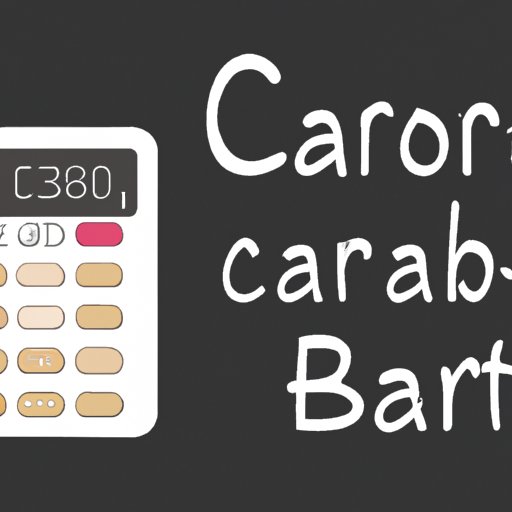Introduction
Losing weight can be a challenge for many people. With so many diet plans and conflicting information, it can be hard to know where to start. However, one method that has been scientifically proven to be effective is counting carbohydrates (carbs). By limiting your carb intake and creating a caloric deficit, you can shave off those extra pounds. In this article, we will explore the ins and outs of carb counting and how it can help you achieve your weight loss goals.
The Science Behind Carb Counting: How to Use a Calculator to Achieve Your Weight Loss Goals
Before we dive into the details of carb counting, let’s first understand what carbs are and how they impact weight loss. Carbohydrates are one of the three macronutrients that our bodies require for energy. They are found in a variety of foods, including bread, pasta, fruits, and vegetables. When we consume carbs, our bodies convert them into glucose, a type of sugar that our cells use for energy.
The problem arises when we consume more carbs than our body needs. Excess glucose is stored as fat, and over time, can lead to weight gain. This is where carb counting comes in. By limiting your daily carb intake, you can create a caloric deficit, which is essential for weight loss. This can be achieved by using a carb calculator to figure out your daily carb limit.
Maximizing Your Carb Limit: Tips for Using a Carb Calculator to Shed Pounds
Once you have calculated your daily carb limit, it is important to know how to adjust your carb intake to continue losing weight. One way to do this is by tracking your carb intake throughout the day. This can be done by keeping a food diary or using a tracking app.
In addition, there are plenty of low-carb foods that you can include in your diet to help you feel full and satisfied. These include lean protein sources like chicken and fish, leafy greens like spinach and kale, and healthy fats like avocado and olive oil.
Carb Counting Made Easy: How Technology Can Help You Achieve Your Weight Loss Dreams
Technology has made carb counting easier than ever before. There are plenty of carb counting apps and websites available that can help you track your daily carb intake. Some of the most popular apps include MyFitnessPal, Cronometer, and Carb Manager. These apps allow you to input your daily food intake, track your progress, and even provide recipe suggestions.
When choosing a carb counting app, it is important to consider the features that are most important to you. For example, some apps may have a larger food database, while others may provide more personalized recommendations.
Why Counting Carbohydrates is Key to Dropping Pounds: An In-Depth Guide to Using a Carb Calculator
Carb counting is a unique approach to weight loss that sets it apart from other diet plans. Unlike fad diets that eliminate entire food groups, carb counting simply limits your daily carb intake. This means that you can still enjoy a wide variety of foods while achieving your weight loss goals.
Additionally, carb counting has been scientifically proven to be effective for weight loss. In fact, a study published in the New England Journal of Medicine found that a low-carbohydrate diet was more effective for weight loss than a low-fat diet.
But don’t just take our word for it. Here are some real-life experiences of people who have successfully lost weight through carb counting:
“Carb counting has been a game-changer for me. I no longer feel restricted by my diet and have been able to lose 20 pounds in just a few months.” – Sarah
“Using a carb calculator has helped me stay accountable and make smart choices throughout the day. I’ve lost over 30 pounds and feel better than ever.” – John
Losing Weight with Carbs on Your Side: A Beginner’s Guide to Using a Carb Calculator for Effective Weight Loss
If you’re new to carb counting, the thought of calculating your daily carb limit may seem overwhelming. However, it is actually quite simple. Here are some common carb-counting terms to know:
- Total carbs: The total amount of carbs in a food item, including fiber and sugar.
- Net carbs: The total amount of carbs minus the fiber. This is the number of carbs that your body actually absorbs.
- Carb limit: The maximum number of net carbs that you can consume per day to achieve your weight loss goals.
When getting started, it is important to gradually adjust to a low-carb diet. This can be achieved by slowly reducing your daily carb intake over time. Don’t be afraid to experiment with different foods and recipes to find what works best for you.
Counting Carbs – The Ultimate Way to Lose Weight: An Explainer on How a Carb Calculator Can Help You Achieve Your Goals
By now, you should have a solid understanding of the benefits of carb counting and how to use a carb calculator to achieve your weight loss goals. Whether you’re looking to shed a few pounds or make a more significant lifestyle change, carb counting can be a valuable tool to get you there.
Remember, weight loss is a journey, and it takes time and dedication to see results. But with carbs on your side, you can reach your goals and feel better than ever before.
Conclusion
In conclusion, carb counting is a powerful tool for weight loss that you can start using today. By calculating your daily carb limit, tracking your intake, and including low-carb foods in your diet, you can create a caloric deficit and shed those extra pounds. With the help of technology and the experiences of others who have successfully lost weight through carb counting, you can achieve your weight loss dreams.
